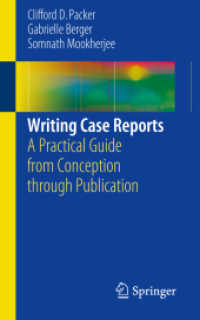- ホーム
- > 洋書
- > 英文書
- > Business / Economics
基本説明
Examining the mix of competency frameworks and selection tools such as psychological and skills assessments, reference-checking and interviews, the author concludes that senior selection choices are holding back organisations and individual carees, with implications for diversity, effectiveness, and social justice.
Full Description
Some of the worst selection practices to be found anywhere can be found at the top of organisations. Even when senior selection is not egregiously bad, rarely is it as good as it could be. Front-line staff and middle managers are selected with much more rigour today than 30 years ago - but not the chairmen, chief executives and chief officers who lead them. So says Douglas Board in Choosing Leaders and Choosing to Lead. Dr Board draws on his extensive experience in executive search and in leadership, coupled with his own academic research embracing the sociology and psychology of scholars such as Pierre Bourdieu and Karl Weick to offer ground-breaking insight into the value and limitations of established selection practice. This book illuminates ways in which senior roles differ from other positions and will help those charged with selecting individuals for senior positions, as well as potential candidates, those concerned with regulating selection policy, and researchers. Examining the classic mix of competency frameworks and selection tools such as psychological and skills assessments, simulations, reference-checking and interviews, the author concludes that senior selection choices are holding back organisations and individual careers, with implications for diversity, effectiveness, and social justice. He contends that while complacent, self-regarding elites will always need vigilant challenge, the scientific approach to selection has weaknesses as well as strengths. Those weaknesses become more pronounced at senior levels, posing particular questions about, amongst other things, the role of intuition and politics.
Contents
Contents: Foreword; Preface; Part I From Bad to Good to Stuck: From bad...; ...to good; ...to stuck. Part II What's Different About Senior Roles?: Complexity, humility and responsibility; Power and politics; A deeper crisis. Part III Re-Thinking Fundamentals: Skill and intuition; Games, skill and belonging; Re-thinking science and leader selection. Part IV So What?: The candidate's perspective; The selector's and society's perspective. Part V Notes: Field notes for candidates; Field notes for selectors. Academic notes; Works cited; Index.







